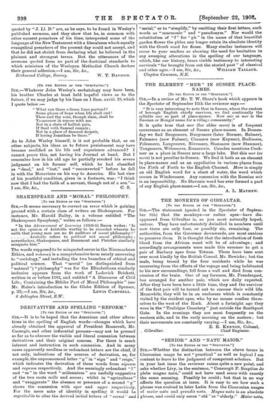SHAKESPEARE AND "MORAL" PHILOSOPHY.
[To THE EDITOR Or THE "SPECTATOR."] SIR,—It seems necessary to correct an error which is gaining ground with a certain class of writers on Shakespeare. For instance, Mr. Harold Bailey, in a volume entitled "The Shakespeare Symphony," writes as follows In the Advancement of Learning (1603-5) Bacon writes : Is not the opinion of Aristotle worthy to be recorded wherein he saith that young men are no fit auditors of moral philosophy ? '
Aristotle refers to political not moral philosophy ; nevertheless, Shakespeare, and Beaumont and Fletcher similarly misquote him."
The words supposed to be misquoted occur in the Nicomaclaean Ethics, and iroAtruzi is a comprehensive term nearly answering to "sociology," and including the two branches of ethical and political science. That "moral" (as distinguished from "natural ") "philosophy" was for the Elizabethans similarly inclusive appears from the work of Lodovick Briskett, written in or before 1582, and entitled "A Discourse of Civil Life; Containing the Ethike Part of Moral Philosophie " (see Mr. Hales's introduction to the Globe Edition of Spenser,






































 Previous page
Previous page